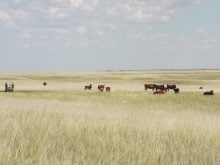Infectious disease can cause reproductive losses in a cow herd.
Vaccination for bovine viral diarrhea, vibrio or IBR can help and producers should consult with a veterinarian to decide on the best approach for their region.
Studies show vaccination works and is widely used in Western Canada, said Cheryl Waldner of the Western College of Veterinary Medicine at the University of Saskatchewan.
“There was pretty good protection for differences in pregnancy but it does not cover all reproductive losses,” she said during a recent webinar from the Beef Cattle Research Council.
Read Also

Feds propose overhaul of chronic wasting disease control program
Chronic Wasting disease control program getting updated by Canadian Food Inspection Agency with feedback encouraged from producers.
BVD is one of the most common problems. Although the prevalence of the disease is not exactly known, earlier work in 2002 estimated nine percent of herds had a persistently infected animal. Persistently infected animals cannot be cured and can infect others.
There are good vaccines on the market and many producers use them. Modified live vaccines are most commonly used and field studies regularly monitor cattle to see if they make a difference.
Cows in community pastures are at the highest risk for picking up the disease.
In field conditions, a cow-calf study showed vaccinated cows got pregnant a week faster than those that are not vaccinated.
Unvaccinated cows on community pastures were three times more likely to be open and two times more likely to abort.
If BVD is suspected, consider target testing abortions, stillbirths and calf losses due to sickness or an abnormality.
Leptosporosis is a bacterium responsible for infertility and abortion. It can come from cattle, rodents and wildlife.
Waldner recommends talking over a course of action with a local veterinarian to learn if it is a problem and what vaccination might be used.
Neospora causes abortions in cattle but it does not appear often. There is no vaccine and there are limited control options. It is a parasite and may be carried by coyotes, foxes and sometimes domestic dogs.
Once a cow aborts, there is a chance it could abort again but that risk is small, said Waldner.
Bulls should be tested for semen quality and infectious disease.
Studies show about 60 percent of producers have their vets carry out breeding soundness exams on at least some bulls.
If they pass the soundness exam, the chances of transmitting the venereal diseases trichomoniasis and vibrio should be considered.
Both cause early embryonic death or abortions.
Trichomoniasis is a parasite carried by the bull and passed on to the cow during breeding.
Tests are available but may need to be repeated for the most accurate results.















